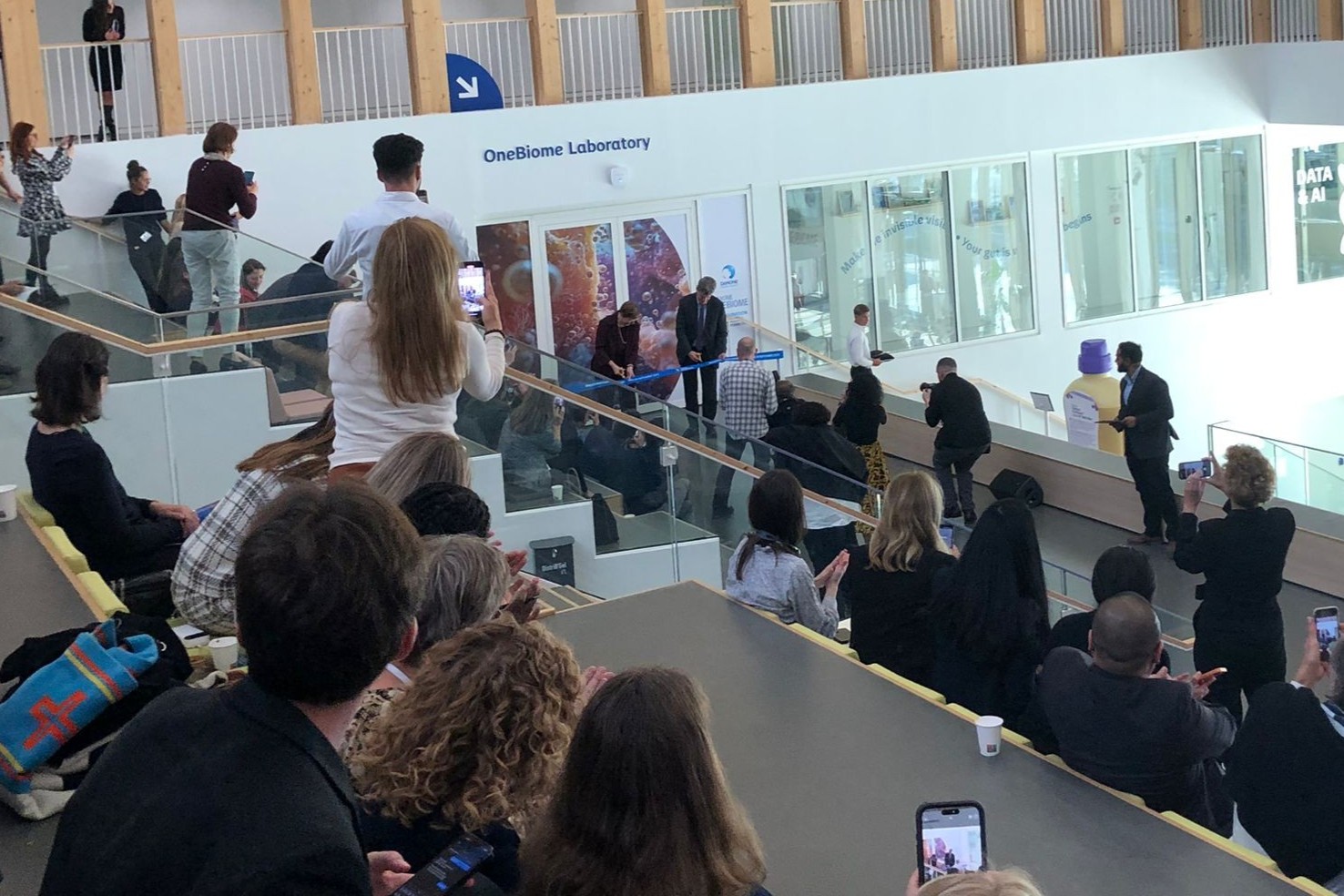Danone opens OneBiome Lab in Paris-Saclay, expanding gut health research for future innovation
Key takeaways
- Danone’s new OneBiome Lab in Paris-Saclay advances microbiome science, combining microbiology, clinical research, and AI to drive nutrition-focused health innovation.
- The facility supports Danone’s Renew Strategy, merging food and health through acquisitions like Akkermansia Company and innovations such as Activia Fiber.
- Danone emphasizes probiotics, prebiotics, postbiotics, and symbiotics, aiming to transform microbiome research into everyday nutrition solutions.

Danone has cut the ribbon on its OneBiome Lab in Paris-Saclay, France, a research hub that aims to bring the science of the gut microbiome closer to everyday nutrition. According to the company, the lab is a milestone in its ambition to lead in food and health innovation. Nutrition Insight attended the launch event.
The facility builds on a first iteration in Singapore, focused on early-life nutrition. In France, the scope is broader — the lab combines microbiology, clinical science, and AI to study how trillions of microbes shape well-being and investigate how food might be designed to meet those needs.
The gut microbiome offers “infinite possibilities,” says Antoine de Saint-Affrique, CEO at Danone, who highlights the company’s depth of knowledge in the gut microbiome.

“That is the future, because more and more science points to the fact that the microbiome is where it all starts, looking at mental and physical disease.”
“If you can qualify and understand causalities within that microbiome, we are capable of devising food that has the most impact on improving our microbiome, maintaining the microbiome when you’re older, or repairing the microbiome when you’re ill or under treatment.”
Expanding gut microbiome research
The OneBiome Lab is located in the Paris-Saclay Danone Research and Innovation Center, which was inaugurated in 2023. De Saint-Affrique says it is located in an “amazing ecosystem” with businesses, start-ups, and academic research. “Investing here is capitalizing on a place which is one of the best ecosystems in Europe.”
Isabelle Esser, chief research and innovation officer at Danone, adds that the launch of the new lab is critical for the company. It will help Danone build an understanding of the microbiome beyond early-life nutrition through different life stages.
 Antoine de Saint-Affrique and Isabelle Esser discussing the OneBiome Lab at the launch event.“With the OneBiome lab, we will create a very large database, which will be enriched with other databases on microbiome-specific populations. This will allow us to study, research, and look at the different mechanics and interactions of the microbiome for different populations.”
Antoine de Saint-Affrique and Isabelle Esser discussing the OneBiome Lab at the launch event.“With the OneBiome lab, we will create a very large database, which will be enriched with other databases on microbiome-specific populations. This will allow us to study, research, and look at the different mechanics and interactions of the microbiome for different populations.”
Esser says that ultimately, the lab will enable Danone to develop predictive models and help translate these into nutrition solutions for specific populations.
“The OneBiome Lab is a way to leverage all that we know from the fermentation library, the understanding of the gut microbiome, the ecosystem that we have, and to move ahead to identify specific populations — to ensure that we can develop evidence and nutrition solutions to those populations, whether that’s patients or consumers.”
Breaking new ground
Danone highlights that microbiome and gut health science are moving quickly. In just a few decades, gut health has gone from an obscure field to one of the most discussed areas of human biology. Yet, for all the enthusiasm, only one in two people believes they have a healthy microbiota. It is a telling figure when half the world says they are unsure if the foundation of their health is sound. We were present at the ribbon cutting for the new lab.
We were present at the ribbon cutting for the new lab.
The company points out that the Paris-Saclay lab is not only a workplace for researchers, it is a signal that a food company can aspire to act as a health company, and that prevention might be found in a yogurt cup or a tailored supplement.
At the same time, Danone’s acquisition of The Akkermansia Company earlier this year underscores that ambition. The company added a pioneer in microbiome-based solutions to a portfolio already stretching from clinical nutrition to supermarket staples. Activia and Actimel now carry sublines like Activia Fiber and Actimel+ Triple Action — products pitched at the everyday consumer but built on layers of scientific research.
“We believe the future of nutrition lies in understanding and harnessing the power of biotics — probiotics, prebiotics, postbiotics, and symbiotics — for gut health,” concludes Esser.
“Since our founding over a century ago, Danone has been a pioneer in this field — leveraging science and technology to create biotic-enriched products that support diverse health needs across all life stages. With these new capabilities, we will continue to push the boundaries of scientific knowledge and its application in food.”













